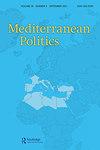中东和北非对什叶派的偏见的国际来源:来自摩洛哥的原始调查证据
IF 1.3
3区 社会学
Q1 AREA STUDIES
引用次数: 0
摘要
中东和北非国际关系日益宗派化是该地区当代政治的一个决定性特征。伊朗试图增加其在外国什叶派人口中的影响力,而沙特阿拉伯和其他逊尼派政权则采取行动遏制这种影响力。在叙利亚、黎巴嫩和伊拉克等异质和两极分化的中东和北非社会,什叶派在人口中占相当大的比例,并在争夺政治权力,人们很自然地认为,宗派主义可能会加剧对什叶派的紧张和偏见。然而,人们对同质的中东和北非社会知之甚少,在那里,什叶派是一个不寻求政治权力的无限小、不受影响的少数民族。这一主题是通过对摩洛哥2000名受访者进行的具有全国代表性的原始调查进行研究的。我们发现,大约59%的人对摩洛哥什叶派表示人际偏见,对有什叶派邻居的前景表示不安。这种偏见是违背直觉的,因为摩洛哥什叶派是一个极少数民族,不到人口的0.1%。我们研究了关于反什叶派偏见来源的三个假设,这些假设将其定位于社会边缘化、宗教信仰和实践以及对地区政治的看法。前两个假设来自现有文献,而第三个是我们独特的理论贡献。我们的研究结果支持了个人对地区政治的看法与反什叶派偏见之间的联系,促进了学术界对中东和北非地区宗教多样性的理解,表明国际发展如何渗透到人际关系中,阻碍对宗派少数群体的接受和宽容。本文章由计算机程序翻译,如有差异,请以英文原文为准。
The international sources of prejudice against Shi‘a in the Middle East and North Africa: Original survey evidence from Morocco
ABSTRACT The increasing sectarianization of the international relations of the Middle East and North Africa (MENA) is a defining feature of the region’s contemporary politics. Iran has sought to increase its influence among Shi‘i populations of foreign countries, while Saudi Arabia and other Sunni regimes have moved to curtail it. In heterogeneous and polarized MENA societies, like Syria, Lebanon, and Iraq, where the Shi‘a constitute a sizable proportion of the population and compete for political power, it is natural to presume that sectarianization likely increases tension and prejudice against the Shi‘a. Yet, little is known about homogenous MENA societies, where the Shi‘a exist as an infinitesimal, uninfluential minority that does not seek political power. This topic is examined using an original, nationally-representative survey of 2,000 respondents in Morocco. We find that about 59 per cent of individuals express interpersonal prejudice against Moroccan Shi‘a, expressing discomfort at the prospect of having a Shi‘i neighbour. Such prejudice is counter-intuitive, given that Moroccan Shi‘a constitute a miniscule minority – less than .1 per cent of the population. We investigate three hypotheses concerning the sources of anti-Shi‘i prejudice, which locate them in social marginalization, religious beliefs and practices, and views about regional politics. The first two hypotheses are drawn from the existing literature, whereas the third is our unique theoretical contribution. Our results, which find support for the connection between individuals’ views about regional politics and anti-Shi‘i prejudice, advance scholarly understanding of religious diversity in the MENA, showing how international developments can trickle down into interpersonal relations to hinder the acceptance and tolerance of sectarian minorities.
求助全文
通过发布文献求助,成功后即可免费获取论文全文。
去求助
来源期刊

Mediterranean Politics
Multiple-
CiteScore
4.40
自引率
5.90%
发文量
37
期刊介绍:
Mediterranean Politics is the only refereed academic journal to focus on the politics, international relations and political economy of the entire Mediterranean area - "Mediterranean" here being understood to refer to all those countries whose borders are defined partially or wholly by the Mediterranean Sea. This focus involves consideration not only of the region itself, but also the significance of developments there for other parts of the world. The journal analyses the central issues that concern Mediterranean countries and assesses both local and international responses to them. While its prime concern is with political developments, the focus of Mediterranean Politics extends to all the factors and dimensions affecting political life.
 求助内容:
求助内容: 应助结果提醒方式:
应助结果提醒方式:


